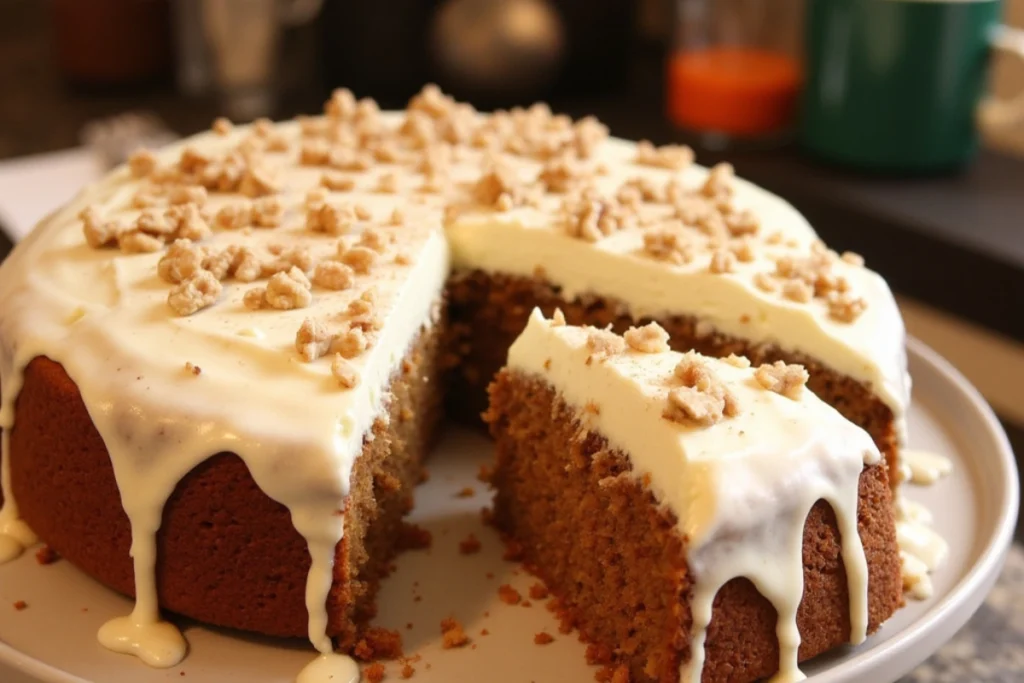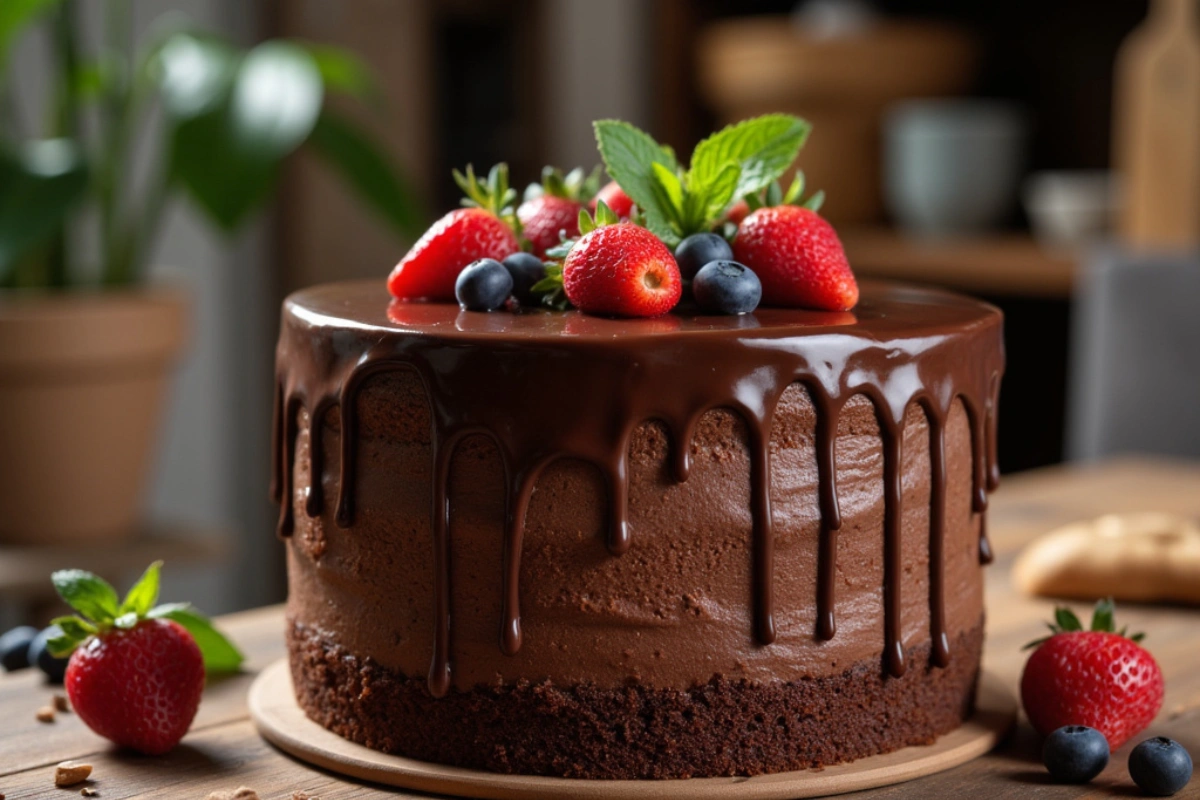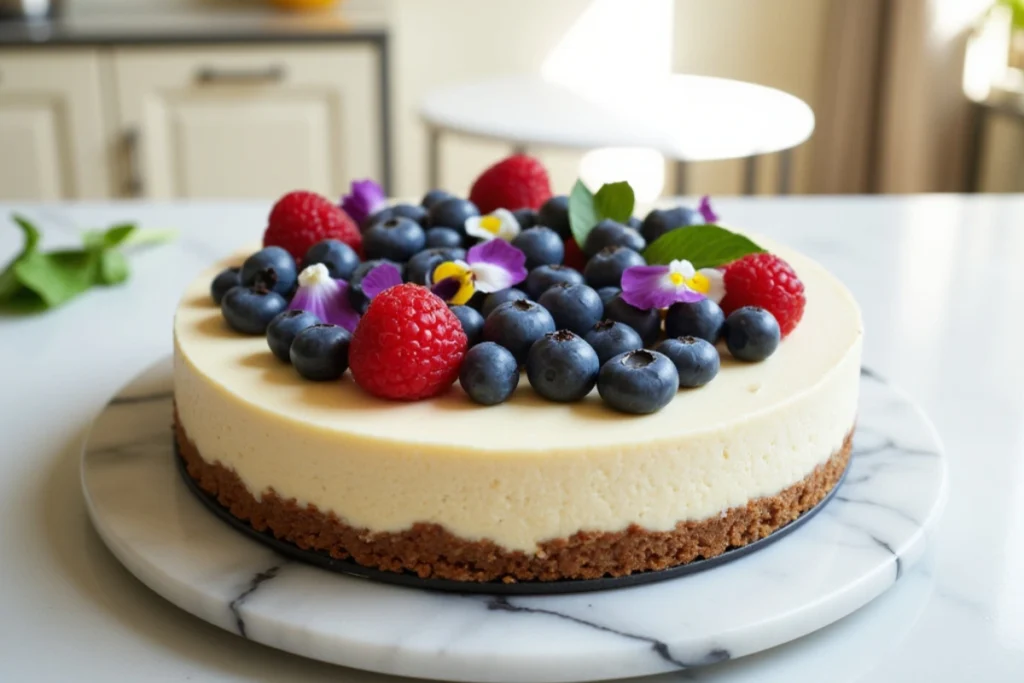Vegan Cake Recipes
Introduction
Vegan cakes are proof that you don’t need dairy or eggs to create delicious, moist, and fluffy baked goods. Whether you’re following a plant-based diet for ethical reasons, health benefits, or simply because you love experimenting with new recipes, vegan cakes offer a delightful way to enjoy desserts guilt-free.
Unlike traditional cakes, vegan cakes rely on plant-based ingredients to achieve the same texture and flavor. Many people assume that removing eggs and dairy will result in dry or dense cakes, but with the right substitutions, you can bake cakes that are just as rich and indulgent as their non-vegan counterparts.
In this article, we’ll explore everything you need to know about baking vegan cakes—from essential ingredients to step-by-step recipes and expert tips. Let’s dive in!
1. Essential Ingredients for Vegan Cakes
To successfully bake vegan cakes, you need to understand which ingredients replace traditional ones. Here are some must-have vegan baking staples:
Flour Alternatives
- All-Purpose Flour – Works well in most recipes.
- Whole Wheat Flour – Adds fiber and a nutty flavor but can make cakes denser.
- Almond Flour – Gluten-free and adds moisture.
- Oat Flour – Another gluten-free option that adds a soft texture.
Egg Substitutes
Eggs play a crucial role in binding and leavening, but there are plenty of plant-based alternatives:
- Flaxseed or Chia Seed Eggs (1 tbsp ground flax/chia + 3 tbsp water = 1 egg)
- Mashed Banana (¼ cup = 1 egg)
- Applesauce (¼ cup = 1 egg)
- Baking Soda + Vinegar (1 tsp baking soda + 1 tbsp vinegar = 1 egg)
Dairy Replacements
- Plant-Based Milk – Almond, soy, oat, or coconut milk work well.
- Vegan Butter – Brands like Earth Balance and Miyoko’s are excellent choices.
- Coconut Cream – A great substitute for heavy cream in frostings.
Natural Sweeteners and Binders
- Maple Syrup – Adds natural sweetness.
- Coconut Sugar – A healthier alternative to white sugar.
- Agave Syrup – Works well in moist cakes.
With these ingredients in hand, you’re ready to start baking!
2. Tools and Equipment for Vegan Baking
A successful bake starts with having the right tools:
Must-Have Baking Tools
- Mixing bowls
- Measuring cups and spoons
- Electric hand or stand mixer
- Spatula for folding ingredients
- Whisk for mixing dry ingredients
Choosing the Right Cake Pans
- Round cake pans (8 or 9-inch) for layered cakes
- Loaf pans for banana bread or pound cakes
- Springform pans for cheesecakes
Mixing and Baking Tips
- Always preheat your oven.
- Avoid overmixing the batter to prevent a dense cake.
- Use parchment paper to prevent sticking.
3. Classic Vegan Chocolate Cake
Ingredients
- 1 ½ cups all-purpose flour
- 1 cup sugar
- ½ cup cocoa powder
- 1 tsp baking soda
- ½ tsp salt
- 1 cup almond milk
- ⅓ cup coconut oil
- 1 tbsp apple cider vinegar
- 1 tsp vanilla extract
Instructions
- Preheat your oven to 350°F (175°C). Grease an 8-inch round cake pan.
- In a bowl, whisk together flour, cocoa powder, sugar, baking soda, and salt.
- Add almond milk, coconut oil, apple cider vinegar, and vanilla extract. Mix until smooth.
- Pour the batter into the cake pan and bake for 30-35 minutes.
- Let the cake cool before frosting.
Vegan Chocolate Frosting
- ½ cup vegan butter
- 2 cups powdered sugar
- ¼ cup cocoa powder
- 2 tbsp almond milk
Mix all ingredients until smooth and spread over the cooled cake.
4. Moist Vegan Vanilla Cake
Ingredients
- 2 cups all-purpose flour
- 1 cup sugar
- 1 tsp baking soda
- 1 ½ tsp baking powder
- 1 cup oat milk
- ½ cup coconut oil
- 1 tbsp apple cider vinegar
- 1 tbsp vanilla extract
Instructions
- Preheat oven to 350°F (175°C). Grease two 8-inch cake pans.
- Mix dry ingredients in a bowl.
- Add wet ingredients and whisk until smooth.
- Pour batter evenly into pans and bake for 30-35 minutes.
- Let cool and frost with vegan buttercream.
5. Vegan Carrot Cake with Dairy-Free Cream Cheese Frosting

Carrot cake is a classic favorite, and this vegan version is just as moist and flavorful as the traditional recipe. The natural sweetness of carrots, paired with warm spices and a tangy dairy-free cream cheese frosting, makes this cake irresistible.
Ingredients for the Cake
- 2 cups all-purpose flour
- 1 cup coconut sugar or brown sugar
- 1 tsp baking soda
- 1 ½ tsp baking powder
- 1 tsp cinnamon
- ½ tsp nutmeg
- ½ tsp salt
- 1 ½ cups grated carrots
- ½ cup applesauce (egg replacement)
- 1 cup almond milk
- ½ cup coconut oil
- 1 tsp vanilla extract
- ½ cup chopped walnuts or pecans (optional)
Instructions
- Preheat oven to 350°F (175°C) and grease a round cake pan.
- Mix dry ingredients in a large bowl: flour, sugar, baking soda, baking powder, cinnamon, nutmeg, and salt.
- Combine wet ingredients in another bowl: almond milk, coconut oil, applesauce, and vanilla.
- Fold in grated carrots and chopped nuts into the wet mixture.
- Mix everything together until just combined (do not overmix).
- Pour into the cake pan and bake for 30-35 minutes or until a toothpick inserted in the center comes out clean.
- Cool completely before frosting.
Dairy-Free Cream Cheese Frosting
- ½ cup vegan butter
- 8 oz vegan cream cheese (such as Kite Hill or Tofutti)
- 2 cups powdered sugar
- 1 tsp vanilla extract
- Beat the vegan butter and cream cheese together until smooth.
- Gradually add powdered sugar and vanilla, mixing until creamy.
- Spread over the cooled cake and enjoy!
6. Gluten-Free Vegan Almond Cake
For those avoiding gluten, this almond cake is the perfect solution. It’s soft, slightly nutty, and pairs beautifully with fruit toppings.
Ingredients
- 2 cups almond flour
- 1 cup gluten-free oat flour
- ½ cup maple syrup
- 1 tsp baking powder
- ½ tsp baking soda
- 1 tsp apple cider vinegar
- 1 cup almond milk
- ½ cup coconut oil
- 1 tsp vanilla extract
Instructions
- Preheat oven to 350°F (175°C) and grease a loaf pan.
- Mix all dry ingredients in a bowl.
- In another bowl, whisk together wet ingredients.
- Slowly fold the wet mixture into the dry ingredients.
- Pour the batter into the pan and bake for 30-35 minutes.
- Let it cool before slicing. Serve with berries or coconut whipped cream.
7. Vegan Red Velvet Cake
Red velvet cake has a unique taste, thanks to its cocoa base and tangy flavor. This vegan version captures that classic richness without dairy or eggs.
Ingredients
- 2 ½ cups all-purpose flour
- 1 ½ cups sugar
- 1 tsp baking soda
- 1 tsp cocoa powder
- ½ tsp salt
- 1 cup almond milk
- 1 tbsp apple cider vinegar
- ½ cup vegetable oil
- 1 tbsp vanilla extract
- 2 tbsp beet puree or natural red food coloring
Instructions
- Preheat oven to 350°F (175°C) and grease two 8-inch cake pans.
- Mix almond milk and vinegar and let sit for 5 minutes.
- Combine dry ingredients in one bowl and wet ingredients in another.
- Slowly mix the wet and dry ingredients together.
- Stir in the beet puree or food coloring.
- Divide batter between the cake pans and bake for 30-35 minutes.
- Let cool before frosting with vegan cream cheese frosting.
8. Vegan Banana Bread Cake
This cake is perfect for breakfast, snack time, or dessert. It’s naturally sweet from ripe bananas and has a soft, fluffy texture.
Ingredients
- 3 ripe bananas (mashed)
- 2 cups whole wheat flour
- 1 tsp baking soda
- ½ tsp cinnamon
- ¼ tsp salt
- ½ cup maple syrup
- ¼ cup coconut oil
- 1 tsp vanilla extract
- ½ cup chopped walnuts or chocolate chips (optional)
Instructions
- Preheat oven to 350°F (175°C) and grease a loaf pan.
- Mix all dry ingredients in a large bowl.
- In another bowl, whisk together mashed bananas, maple syrup, coconut oil, and vanilla.
- Slowly mix the wet ingredients into the dry ingredients.
- Fold in nuts or chocolate chips if using.
- Pour into the pan and bake for 40-45 minutes.
- Let cool before slicing.
9. Vegan Lemon Drizzle Cake
A zesty and refreshing cake that’s perfect for warm days.
Ingredients
- 2 cups all-purpose flour
- 1 cup sugar
- 1 tsp baking soda
- ½ tsp salt
- 1 cup almond milk
- ½ cup coconut oil
- 1 tbsp lemon zest
- ¼ cup lemon juice
Lemon Drizzle
- ½ cup powdered sugar
- 2 tbsp lemon juice
Instructions
- Preheat oven to 350°F (175°C) and grease a loaf pan.
- Mix dry ingredients in a bowl.
- In another bowl, whisk wet ingredients.
- Slowly add wet ingredients to dry and stir.
- Pour batter into the pan and bake for 35-40 minutes.
- Mix lemon juice and powdered sugar for the drizzle.
- Once the cake is out of the oven, pour the drizzle over the top.
10. Raw Vegan Cheesecake (No-Bake Recipe)
For a creamy, rich dessert without any baking, this no-bake cheesecake is a must-try!
Crust Ingredients
- 1 cup almonds
- 1 cup dates
- 1 tsp vanilla extract
Filling Ingredients
- 2 cups cashews (soaked overnight)
- ½ cup coconut cream
- ¼ cup maple syrup
- 2 tbsp lemon juice
- 1 tsp vanilla extract
Instructions
- Blend crust ingredients in a food processor until sticky. Press into a springform pan.
- Blend filling ingredients until smooth. Pour over crust.
- Freeze for at least 4 hours.
- Let thaw for 10 minutes before serving.
11. Common Mistakes to Avoid in Vegan Baking
Vegan baking can be tricky if you’re not familiar with ingredient substitutions and techniques. Here are some common mistakes and how to avoid them:
1. Using the Wrong Egg Substitute
Not all egg replacements work the same way. Flax eggs are great for denser cakes, while baking soda and vinegar work better for light and fluffy cakes.
2. Overmixing the Batter
Overmixing can lead to a dense cake. Stir just until combined to avoid gluten development, which can make your cake tough.
3. Not Measuring Ingredients Properly
Baking is a science, and even slight measurement errors can affect the outcome. Always use measuring cups and spoons accurately.
4. Skipping the Vinegar or Acid
Acids like apple cider vinegar help activate baking soda, making cakes rise properly. Don’t skip this crucial ingredient.
5. Not Allowing Cakes to Cool Completely Before Frosting
If you frost a warm cake, the frosting will melt. Always wait until your cake is fully cooled before decorating.
12. Best Frostings and Fillings for Vegan Cakes
A cake is only as good as its frosting! Here are some delicious vegan options:
1. Vegan Buttercream Frosting
- ½ cup vegan butter
- 2 cups powdered sugar
- 2 tbsp almond milk
- 1 tsp vanilla extract
Mix all ingredients until creamy and fluffy.
2. Dairy-Free Chocolate Ganache
- 1 cup coconut cream
- 1 cup dairy-free dark chocolate chips
Heat coconut cream, pour over chocolate chips, and stir until smooth. Let cool before spreading over the cake.
3. Whipped Coconut Cream
- 1 can full-fat coconut milk (chilled overnight)
- 2 tbsp maple syrup
- 1 tsp vanilla extract
Scoop out the solid part of the coconut milk and whip with maple syrup and vanilla.
13. How to Decorate Vegan Cakes Like a Pro
Presentation matters! Here are some easy decorating tips:
1. Use Fresh Fruits
Berries, citrus slices, and pomegranate seeds add natural color and sweetness.
2. Sprinkle with Nuts or Seeds
Chopped almonds, coconut flakes, or pumpkin seeds add texture and crunch.
3. Create Piping Designs
Use a piping bag with different nozzles to create swirls, rosettes, or patterns on your cakes.
4. Edible Flowers
Lavender, pansies, and roses make stunning cake toppers.
14. Storage and Shelf Life of Vegan Cakes
Wondering how to keep your vegan cakes fresh? Here’s a guide:
How Long Do Vegan Cakes Last?
- Room Temperature – 2 to 3 days in an airtight container.
- Refrigerated – Up to 5 days for frosted cakes.
- Frozen – Up to 3 months if properly wrapped.
Best Storage Tips
- Store cakes in airtight containers to prevent drying out.
- Wrap slices in plastic wrap before freezing.
- If using fruit toppings, add them just before serving to maintain freshness.
15. Final Tips for Baking the Perfect Vegan Cake
Before you start baking, keep these expert tips in mind:
- Experiment with Flavors – Mix spices, extracts, and fruit purees to create unique cakes.
- Substitute Ingredients as Needed – Use oat flour for a healthier cake or coconut milk for extra richness.
- Taste as You Go – Adjust sweetness, spice, or acidity before baking.
- Don’t Be Afraid to Fail – Vegan baking is trial and error. Keep experimenting until you find your perfect recipe.
Conclusion
Baking vegan cakes is easier than you think! With the right ingredients, techniques, and a bit of creativity, you can make delicious, moist, and flavorful cakes without using eggs or dairy. Whether you’re making a rich chocolate cake, a fluffy vanilla sponge, or a tangy lemon drizzle cake, there’s no limit to the delicious treats you can create.
Now it’s time to head to the kitchen and start baking! Try out these recipes, experiment with flavors, and enjoy the wonderful world of vegan baking.

